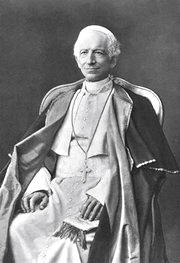 It was in a gloomy atmosphere that the first conclave since the fall of Rome gathered, but that conclave produced a pope who would lift up the hearts of Catholics, and indeed of all men of good will throughout the world, the great Leo XIII.
It was in a gloomy atmosphere that the first conclave since the fall of Rome gathered, but that conclave produced a pope who would lift up the hearts of Catholics, and indeed of all men of good will throughout the world, the great Leo XIII.
Gioacchino Pecci was born at Carpineto on March 2, 1810. After education at the Jesuit college in Viterbo, the Roman College, and the College for Nobles, Pecci hesitated about becoming a priest; but in 1837 he made his decision and plunged wholeheartedly into the priestly life.
In 1838 Gregory XVI sent Pecci to rule Benevento as a legate. He gave the district a taste of good government by running down the bandits who infested the area. Moved to Perugia in 1841, Pecci started a bank for the poor and introduced other reforms. In 1843 he went as nuncio to Belgium, and when recalled in 1845 he was made bishop of Perugia. Pius IX made him a cardinal in 1853. Pecci ruled his diocese in such a manner as to foreshadow his career as pope. He insisted on religious instruction and on the study of Aquinas. He spoke out against the social evils of the day. When the Piedmontese took Perugia from the Pope in 1860, anticlerical politicians made life miserable for Catholics. Pecci stood up to them, registering eighteen protests; yet such was his diplomacy that despite his manly defense of church rights, he got along with the government. In 1877 Pius IX called him to Rome and made him camerlengo. After Pius died Pecci succeeded him as Leo XIII.
Leo found the Church under fire in many countries, and except for Italy, his policy was one of conciliation. He made the road to Canossa easy for Bismarck, who called off his anti-Catholic campaign. He tried to get French Catholics to come down from a royalist dream world to republican reality. He soothed the English by frowning on the vigorous methods of Irish agrarian reformers. He even won a few concessions for the Czar's oppressed Catholic subjects. When in 1885 Germany and Spain accepted Leo's arbitration in a dispute over the Caroline Islands, it was a token of the Pope's new prestige.
It was as a leader in ideas that Leo is truly great. He saw the need for emphasizing the value of St. Thomas, and he recalled Catholic thinkers to the study of Aquinas. He encouraged biblical studies and while rightly cautious about certain "critical" tendencies of the age, he left the way open to continued improvement. To historians Leo was a true friend. He opened the Vatican archives to research and he urged scholars to tell the truth and tell it whole.
Above all, by his encyclical "

